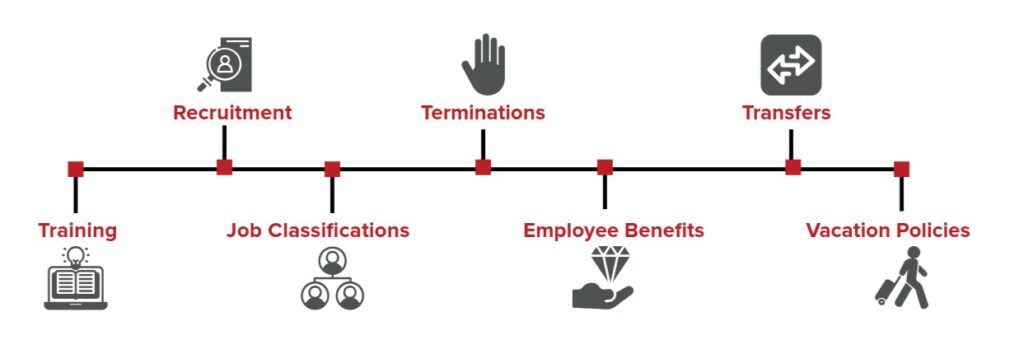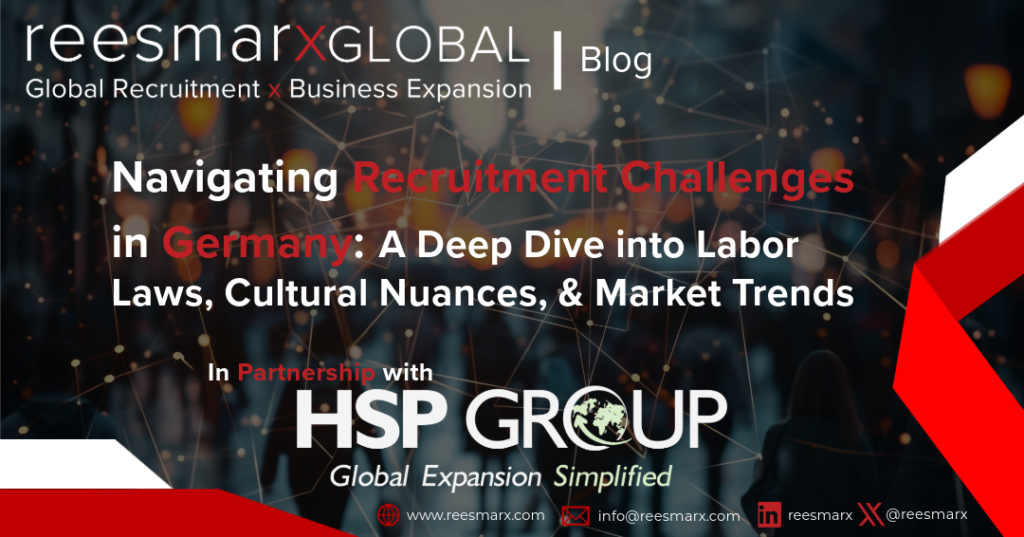Expanding into new jurisdictions is a challenge for any business, but some markets are more complex than others. In this blog series with HSP Group and reesmarxGLOBAL, we’ll be exploring the recruitment and employment landscape in five countries, highlighting the unique challenges businesses face.
First up: Germany. Known for its robust economy, advanced industries, and strict labor laws, Germany offers both great opportunities and significant hurdles for employers looking to enter the market.
Labour Market Challenges: Skilled Worker Shortage
While Germany offers a well-established labor market, it is also grappling with a skilled worker shortage. This is particularly acute in industries such as IT, engineering, and manufacturing. The country’s aging population and shrinking workforce have led to a significant gap in the talent pool, making it difficult for businesses to fill critical positions.
In fact, 35% of companies report struggling with productivity loss due to unfilled roles, highlighting the urgency and competition for skilled talent. For companies entering the German market, this shortage can significantly impact recruitment efforts, forcing employers to compete for a limited pool of qualified candidates.
Shifting Expectations: Employee Benefits & Work-Life Balance
In addition to the skilled worker shortage, another trend that has emerged in Germany’s labor market is the evolving expectations of employees. Competitive compensation is no longer enough to attract and retain top talent. Today’s professionals are increasingly seeking comprehensive benefits packages, which include generous health insurance, vacation time, retirement plans, and other perks.
Furthermore, work-life balance has become a priority for many German employees, particularly in the wake of the COVID-19 pandemic. Remote work options, flexible schedules, and family-friendly policies are now seen as essential for attracting and retaining talent. Companies that fail to adapt to these changing expectations may find themselves at a disadvantage in the competitive recruitment market.

Strict Protocols for Employment Documentation
One of the first things businesses learn when expanding into Germany is that the country possesses stringent requirements for employment documentation. Unlike many other European countries, Germany still insists on wet ink signatures for a number of crucial employment documents, including employment contracts and termination notices. This means digital signatures are not accepted for many important documents, which can be a hurdle for companies that are used to paperless processes.
Moreover, when it comes to signing documents on behalf of the employing entity, the power of attorney must be clearly established. Only those individuals with the legal authority to act on behalf of the company are allowed to sign these documents, which adds another layer of complexity to administrative processes.
The GDPR & Data Protection
Germany is also a staunch advocate of data privacy. The General Data Protection Regulation (GDPR), adopted across the European Union, establishes strict guidelines for collecting, storing, and processing personal data. However, Germany’s regulations go a step further with its own individual privacy laws, making the protection of employee data a top priority for employers.
This means that businesses need to be meticulous about how they manage employee information, from recruitment to ongoing employment. Failing to comply with GDPR and German privacy laws can result in significant penalties, so companies entering the market must be prepared to implement rigorous data protection policies.
Works Councils & Labor Relations
Another unique aspect of employment in Germany is the role of works councils. These employee representative bodies are a fundamental part of labor relations, and they have the right to be informed and consulted on a wide range of organizational matters. This includes decisions related to training, recruitment, job classifications, terminations, transfers, vacation policies, and employee benefits.
While works councils are generally seen as a positive force in terms of fostering transparency and collaboration between employees and employers, they can also add complexity to decision-making processes. Businesses must understand the scope of works councils’ involvement to ensure compliance and to avoid conflicts.

Overtime Rules & Working Hours
German labor laws are particularly clear when it comes to overtime. Employees can only be required to work overtime if explicitly stated in their employment contract or in a collective bargaining agreement. This means that employers must carefully define overtime expectations at the outset of the employment relationship.
What’s more, overtime pay is not strictly regulated by law, and many businesses may include compensation for overtime work as part of the employee’s regular monthly salary. However, this must be clearly outlined in the employment agreement to avoid misunderstandings or legal challenges.
In addition to overtime provisions, employers in Germany have a legal obligation to track and record working hours for all employees. Companies that fail to implement proper systems for tracking time could face penalties, making time management systems a critical part of the employer’s operational toolkit.
The Unfair Dismissal Act
Terminating an employee in Germany is a delicate process, and businesses must adhere to strict guidelines. The Unfair Dismissal Act (Kündigungsschutzgesetz) applies to employers with 10 or more employees, and it introduces a detailed framework for justifying and processing employee terminations.
The law requires employers to provide legitimate reasons for dismissals, whether for performance issues, operational needs, or misconduct. The process for dismissing an employee also includes several procedural steps, and failure to follow these procedures can lead to costly legal consequences. This regulatory environment means that hiring and firing decisions in Germany require careful legal consideration.
How we Help Clients Succeed in Germany
For companies like reesmarxGLOBAL, success in Germany requires a deep understanding of the local regulatory environment and cultural nuances. By working closely with businesses to navigate the complexities of Germany’s labor laws, reesmarxGLOBAL provides tailored recruitment and workforce solutions that meet the unique needs of both employers and employees.
Specializing in high-demand sectors such as IT, manufacturing, and niche industries, reesmarxGLOBAL helps clients build effective, sustainable teams in Germany, offering expertise in everything from recruitment strategies to compliance with labor laws. Whether it’s understanding the importance of works councils or helping businesses navigate Germany’s complex termination processes, reesmarxGLOBAL is committed to ensuring that clients can thrive in this competitive and regulated market.
How HSP Global Helps Clients Succeed in Germany
We can help you navigate the complex regulatory environment in Germany. Our expert-led managed services and technical consulting were designed to help you expand with ease. Backed by GateWay, our pioneering global expansion management (GXM) system, we bring an unparalleled focus on the customer experience. By unifying everything you need for cross-border success on a single platform, you can effortlessly and compliantly manage your international footprint.
Conclusion
Germany’s labor market presents both opportunities and challenges for businesses looking to expand. From strict employment documentation protocols to the growing competition for skilled talent, employers must be prepared to navigate a complex regulatory landscape. Understanding the cultural and legal factors that influence recruitment and employment in Germany is key to success. With the right support, companies can build strong, compliant workforces that meet the demands of this dynamic market.
In the coming weeks, we’ll be exploring other jurisdictions and the recruitment challenges businesses face in those markets. Stay tuned for more insights as we continue our series with HSP Group.
The HSP Group & reesmarxGLOBAL partnership
HSP Group and reesmarxGLOBAL have established a strong partnership, effectively supporting clients in their expansion into new regions. HSP Group specializes in employment, HR, and payroll management, while reesmarxGLOBAL focuses on talent acquisition and headhunting. The synergy between recruitment firms and employment solution providers is often overlooked, yet it is crucial for several reasons.
One significant advantage is the enhanced transparency in processes and communication. As clients venture into unfamiliar territories, they may not know the right questions to ask or the obstacles they might face. By collaborating closely, these two types of firms can proactively identify potential challenges and opportunities, ensuring a smoother transition and a more informed approach long before clients arrive in their new markets.






